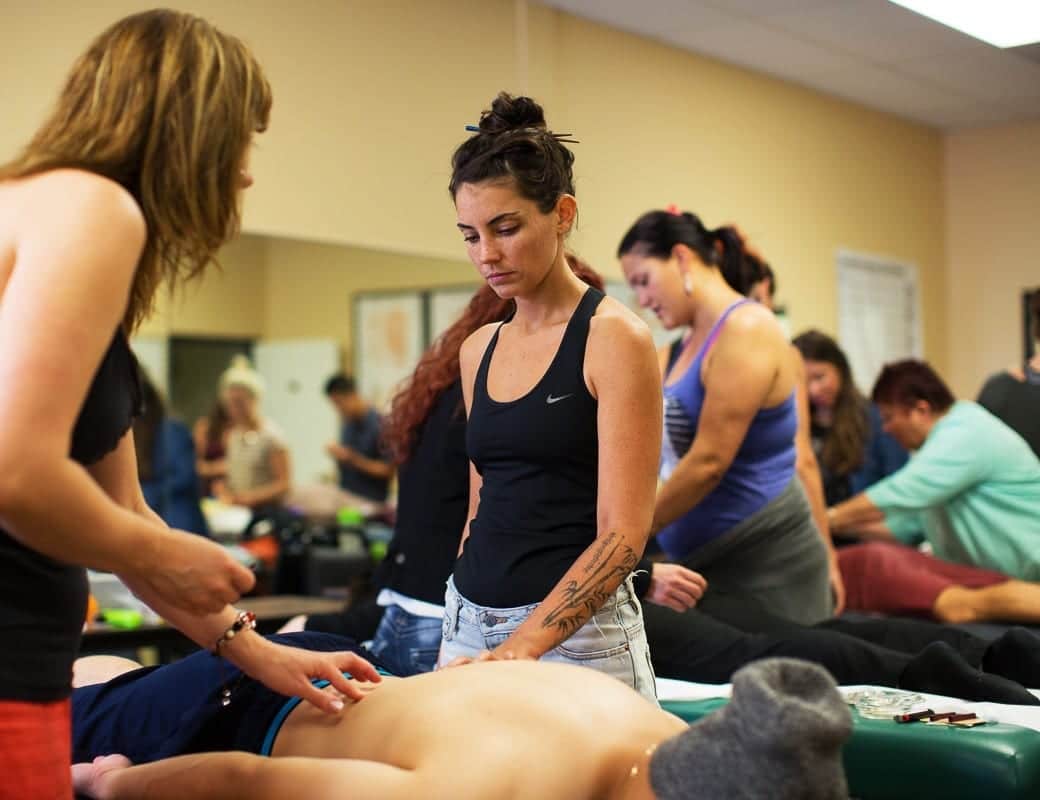If you have a passion for natural healing, a career in acupuncture could be a good fit. Yet you may have some questions. How long is acupuncture school? How much does acupuncture school cost? These are valid questions and worth considering as you look forward to a potential career in acupuncture. Let’s take a look at what this career involves, what it has to offer, and how the right training program can help you pursue a successful future as a licensed acupuncturist.
What is Acupuncture?
Acupuncture is a healing modality that uses sterile needles to stimulate areas of the body to reduce pain, lessen inflammation and improve immune system functions. Its roots come from the belief that energy, also called qi, flows through the body. This energy can be adjusted to address pain, inflammations and other issues related to the health and wellness of the patient. Acupuncturists are professionals trained in the safe and effective application of acupuncture needles to help people feel their best.
Though it may be newly popular in the United States, acupuncture is an ancient practice. Chinese medicine is one of the oldest continuous systems of medical knowledge and practice in history. Early references to this Eastern healthcare knowledge can be found in historical records from 2,000 years ago. Acupuncture is part of this body of knowledge and practice. It is effective at treating a wide range of complaints, including:
- Anxiety and stress
- Back pain
- Menstrual symptoms
- Fibromyalgia
- Headaches
- Addiction
- Carpal tunnel syndrome
- Asthma
- Osteoarthritis and arthritis
Many patients will go to an acupuncturist when traditional Western medicine has failed to help. There is a lot of satisfaction to be had by acupuncturists who can help a patient when mainstream medicine alone cannot.
What do Acupuncturists Do?
Acupuncturists apply sanitary needles to specific areas of the body to help treat a variety of conditions. As medical practitioners, they assess the health and wellness of their patients to choose treatment methods most likely to work. Like traditional Western medicine practitioners, they document and record patient information. They also often work as a team with other holistic health providers, such as chiropractors and massage therapists, as well as traditional Western medicine professionals to help patients achieve a greater level of wellness.
Are you interested in becoming a certified acupuncture professional?
Visit the links below to explore our specialized acupuncture programs at a campus near you:
The Pros and Cons of Starting a Career in Acupuncture
If you have a passion for helping people feel well and believe in natural health treatments, then a career in acupuncture could be a good fit. As with any career and educational choice, there are pros and cons that you’ll want to consider before starting this career path.
Pros of a Career in Acupuncture
- Flexibility—Acupuncturists have a lot of flexibility in their careers. While some will choose to partner with a large clinic and have set hours, others will launch a solo practice, giving them the added flexibility of setting their own schedules.
- Healing and teaching—A career in acupuncture is ideal for individuals who like to help others overcome pain and lead better lives. It also is ideal for those who like to share knowledge with others, especially knowledge that can lead to living better and healthier. As this treatment is not as well-known in the Western world as other therapies, acupuncture treatments are still a mystery to some. So, acupuncturists will often spend time educating patients about the therapy, as well as other treatments, and lifestyle changes they can implement to improve overall health.
- High interest—As acupuncture grows in popularity, so has demand for skilled practitioners. As graduates of an accredited acupuncture school, skilled and licensed acupuncturists will find plenty of opportunities to grow in their careers.
- Job satisfaction—A career in acupuncture provides a high level of job satisfaction. You are often able to help people with chronic medical conditions feel better, even when conventional medicine has failed. This can be very emotionally rewarding.
- Variety of settings and specialties – There is a wide range of practice settings available to licensed acupuncturists, from hospitals to integrative healthcare centers, athletic teams, group practices, or even charitable organizations such as Acupuncturists Without Borders. In addition, just like with Western medicine, one may choose to target a variety of conditions and populations such as pediatric acupuncture, orthopedic acupuncture, women health and fertility, oncology, addiction, and more.
Potential Cons of a Career in Acupuncture
- Weekend work—Though acupuncturists who own their own practice have the ability to set their schedules, they must also consider the time constraints of their patients. This may mean offering weekend and evening schedules to accommodate working adults and students who are busy during the day.
- Advanced education—The entry-level education for this field is a master’s degree. Most acupuncture practitioners now enter the field with a doctorate degree. To achieve success in this career, aspiring acupuncturists need to complete several years of advanced training. They also need to earn a license for the state in which they want to practice. Acupuncture school cost could be a drawback to some, but there are financial aid options to those who choose an accredited school.
- Long lead time—Starting a career in acupuncture, particularly if you are looking at a private practice, can be time-consuming. It can take approximately two-to-five years for a new practice to become established, and this initial period can feel discouraging to a new practitioner.
How to Start a Career in Acupuncture
If, after reviewing this list of pros and cons, you believe that a career in acupuncture is a good fit for you, then it’s time to find a solid training program. The best acupuncture training program may not be the cheapest, but there are many resources available to help you finance your education including federal financial aid, scholarships, and grants.
You could also start by earning an undergraduate degree in massage therapy. After graduating, you could continue on with a master’s or doctorate degree from an accredited acupuncture school. The training in acupuncture is very specific, so choosing the right school is important. There are approximately 30 programs accredited by the Accreditation Commission for Acupuncture and Herbal Medicine in the United States, and they take between two and five years to complete.
At Pacific College of Health and Science, we offer a masters and doctorate of Acupuncture programs that are ACAHM accredited. The college also carries a prestigious regional accreditation by WASC’s Senior College and University Commission accreditation (WSCUC).
Your training at the school for acupuncture will include extensive hands-on experience in acupuncture. This will give you the chance to practice the art under supervision, so you can get a feel for what your daily work will be like.
After graduation, you will need to apply for an acupuncturist’s license. The National Certification Board for Acupuncture and Herbal Medicine is typically the required credential in most states, but you will need to check your state’s requirements before applying for your license to be sure. NCBAHM certification is valid for four years, and you will need to pursue re-certification through continuing education credits.
Acupuncture Career Outlook
The Bureau of Labor Statistics Occupational Handbook outlines acupuncturists’ career outlook, stating that the average salary as of May 2024 was $78,140. As acupuncture grows in popularity, the need for more trained practitioners will also grow. Each year in the United States, CareerOneStop estimates 1,700 jobs open up for acupuncturists. This is just job openings and does not indicate the number of new practitioners who will be working in independent practices.
Demand for natural practitioners will also likely increase in the coming years, as indicated by 67% of Generation Z and 44% of Baby Boomers who said they would be more likely to use alternative medicine in the 2021 Survey of Healing Habits. As younger generations continue to see the value of non-traditional healthcare options, demand for trained and licensed acupuncturists will continue to grow.
Start Your Acupuncture Training Today!
If you are interested in learning more about the San Diego acupuncture program, New York acupuncture program, or Chicago acupuncture program offered at Pacific College of Health and Science, visit admissions or contact us today.
Featured Posts:

